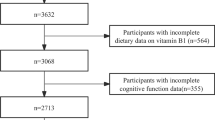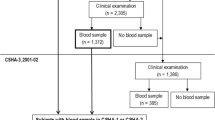Abstract
Objectives
The aim of this study was to examine the association between dephospho-uncarboxylated matrix Gla protein (dp-ucMGP), an indicator of vitamin K status, and cognitive decline, and the modifying role of 25(OH)D.
Design
Longitudinal study with six years follow-up.
Setting
Community based.
Participants
599 participants of the Longitudinal Aging Study Amsterdam (aged 55-65 years).
Measurements
Information processing speed and a composite Z-score by combining three domains of cognition reflecting general cognitive functioning.
Results
Generalized estimating equations (GEE) showed no significant associations between dp-ucMGP and decline in general cognitive functioning. Vitamin D modified the association between dp-ucMGP and speed of information processing (p<0.05). In the group with a 25(OH)D concentration > 50 nmol/l, the highest tertile of dp-ucMGP (>406 pmol/l), which corresponds to lower vitamin K levels, was associated with 1.5 higher score on information processing speed (p=0.023) as compared to the lowest tertile of dp-ucMGP.
Conclusion
In contrast to our hypothesis, a suboptimal vitamin K was not associated with cognitive decline in middle-aged adults.
Similar content being viewed by others
References
Presse N, Belleville S, Gaudreau P, Greenwood CE, Kergoat MJ, Morais JA, Payette H, Shatenstein B, Ferland G. Vitamin K status and cognitive function in healthy older adults. Neurobiol Aging 2013; 34: 2777–2783.
Booth SL, O’Brien-Morse ME, Dallal GE, Davidson KW, Gundberg CM. Response of vitamin K status to different intakes and sources of phylloquinone-rich foods: comparison of younger and older adults. Am J Clin Nutr 1999; 70: 368–377.
Cranenburg ECM, Koos R, Schurgers LJ, Magdeleyns EJ, Schoonbrood THM, Landewé RB et al. Characterisation and potential diagnostic value of circulating matrix Gla protein (MGP) species. Thromb Haemost 2010; 104: 811–822.
Dalmeijer GW, Van der Schouw YT, Magdeleyns EJ, Vermeer C, Elias SG, Velthuis BK, de Jong PA, Beulens JW. Circulating species of matrix Gla protein and the risk of vascular calcification in healthy women. Int J Cardiol 2013; 15: 168(6):e168–170.
Van den Heuvel EGHM, Van Schoor NM, Lips P, Magdeleyns EJP, Deeg DJH, Vermeer C, Den Heijer M. Circulating uncarboxylated matrix Gla protein, a marker of vitamin K status, as a risk factor of cardiovascular disease. Maturitas 2014; 77: 137–141.
Comijs HC, Kriegsman DM, Dik MG, Deeg DJ, Jonker C, Stalman WA. Somatic chronic diseases and 6-year change in cognitive functioning among older persons. Arch Gerontol Geriatr 2009; 48: 191–196.
Farzaneh-Far A, Weissberg PL, Proudfoot D, Shanahan CM. Transcriptional regulation of matrix gla protein. Z Kardiol 2001; 90: 38–42.
Buell JS, Scott TM, Dawson-Hughes B, Dallal GE, Rosenberg IH, Folstein M, Tucker KL. Vitamin D is associated with cognitive function in elders receiving home health services. J Gerontol A Biol Sci Med Sci 2009; 64: 888–895.
Breitling LP, Perna L, Müller H, Raum E, Kliegel M, Brenner H. Vitamin D and cognitive functioning in the elderly population in Germany. Exp Gerontol 2012; 47: 122–127.
Schurgers LJ, Vermeer C. Determination of phylloquinone and menaquinones in food: Effect of food matrix on circulating vitamin K concentrations. Haemostasis 2000; 30: 298–307.
Shearer MJ, Bach A, Kohlmeier M. Chemistry, nutritional sources, tissue distribution and metabolism of vitamin K with special reference to bone health. J Nutr 1996; 126: 1181S–1186S.
Booth SL, Suttie JW. Dietary intake and adequacy of vitamin K. J Nutr 1998; 128: 785–788.
Huisman M, Poppelaars J, van der Horst M, Beekman ATF, Brug J, van Tilburg TG et al. Cohort profile: The longitudinal aging study Amsterdam. Int J Epidemiol 2011; 40: 868–876.
Denisova NA, Booth SL. Vitamin K and sphingolipid metabolism: evidence to date. Nutr Rev 2005; 63: 111–121.
Jelicic M, Jonker C, Deeg DJH. Effect of low levels of serum vitamin B-12 and folic acid on cognitive performance in old age: A population-based study. Dev Neuropsychol 2001; 20: 565–571.
Van den Kommer TN, Dik MG, Comijs HC, Jonker C. Homocysteine and inflammation: Predictors of cognitive decline in older persons? Neurobiol Aging 2010; 31: 1700–1709.
Savage RD. Alphabet Coding Task 15. Murdoch University, Perth, Western Australia. 1984.
Rey A. L’examen clinique en psychologie. Presses Universitaire de France, Paris, France. 1964.
Raven JC. Manual for the Coloured Progressive Matrices (revised). NFER-Nelson, Windsor, UK. 1984.
Havekes LM, De Knijff P, Beisiegel U, Havinga J, Smit M, Klasen E. A rapid micromethod for apolipoprotein E phenotyping directly in serum. J Lipid Res 1987; 28: 455–463.
Twisk JW, de Vente W. Roaming through methodology. XXII. Application of techniques for longitudinal data analysis. Ned Tijdschr Geneeskd 2000; 144: 1680–1683.
Carrié I, Bélanger E, Portoukalian J, Rochford J, Ferland G. Lifelong low-phylloquinone intake is associated with cognitive impairments in old rats. J Nutr 2011; 141: 1495–1501.
Author information
Authors and Affiliations
Corresponding author
Rights and permissions
About this article
Cite this article
van den Heuvel, E.G.H.M., van Schoor, N.M., Vermeer, C. et al. Vitamin K status is not associated with cognitive decline in middle aged adults. J Nutr Health Aging 19, 908–912 (2015). https://doi.org/10.1007/s12603-015-0579-8
Received:
Accepted:
Published:
Issue Date:
DOI: https://doi.org/10.1007/s12603-015-0579-8




